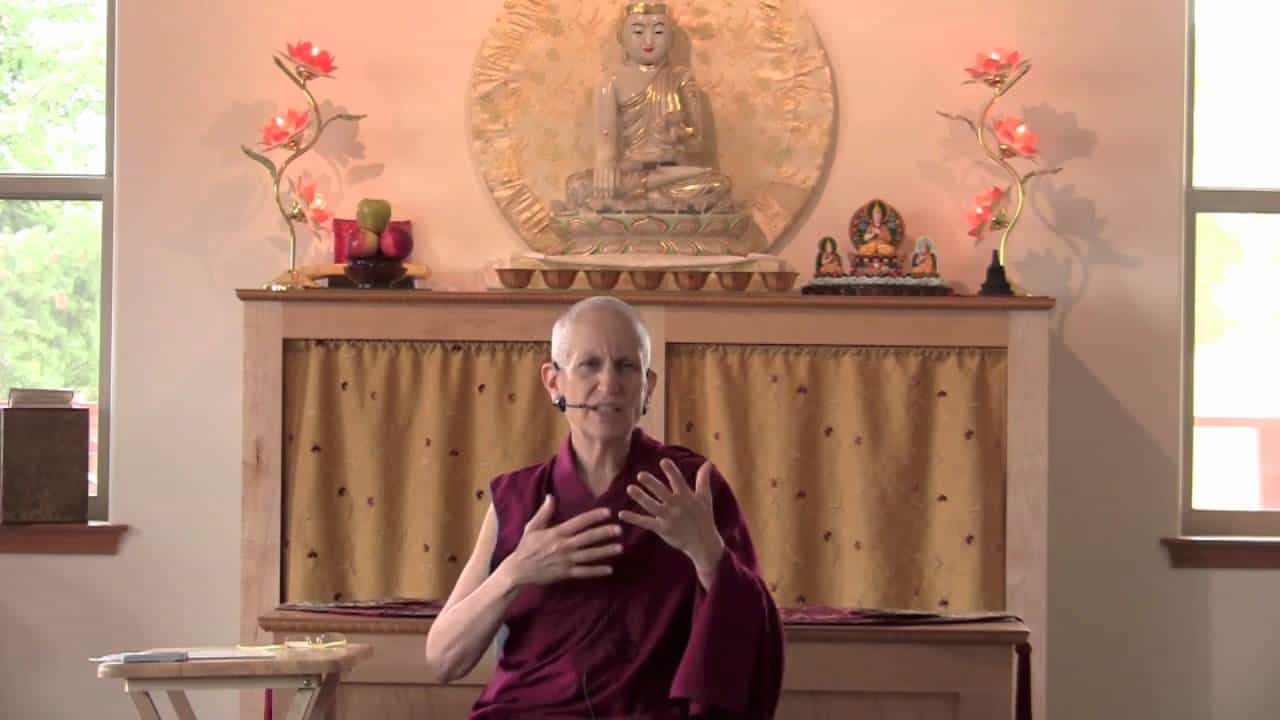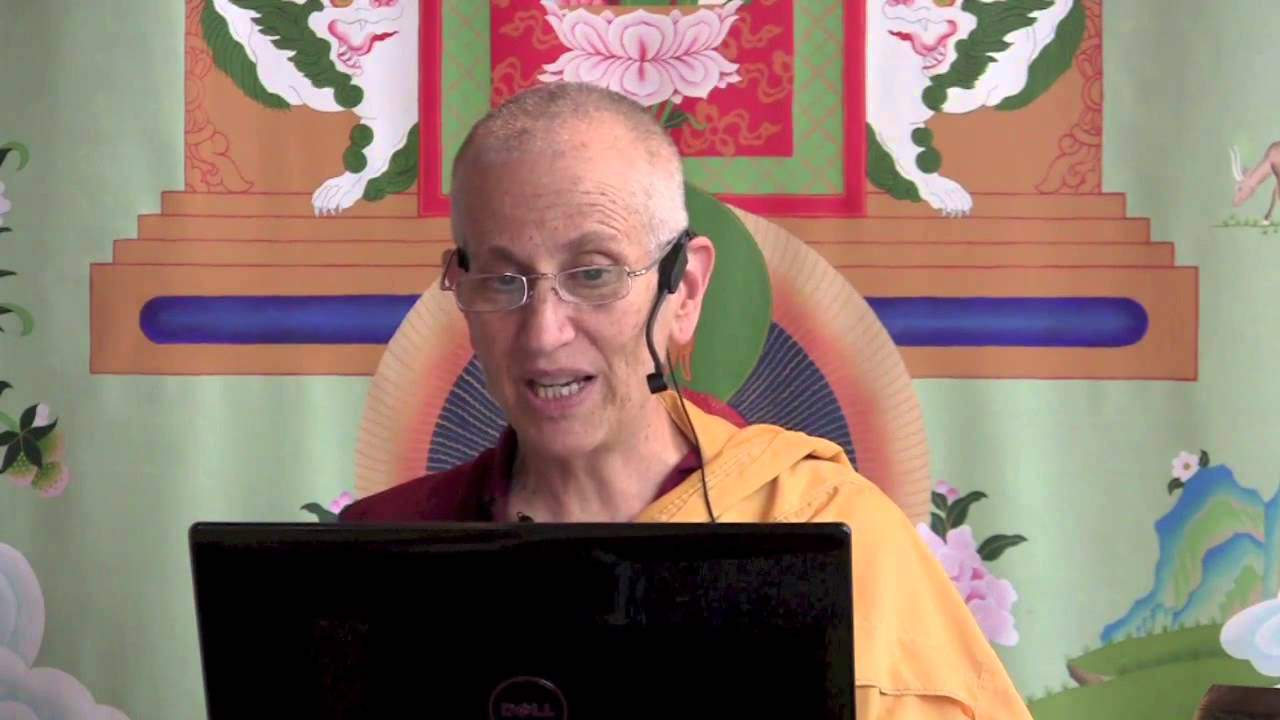Having a kind heart
Part of a series of teachings on the text The Essence of a Human Life: Words of Advice for Lay Practitioners by Je Rinpoche (Lama Tsongkhapa).
- The importance of having a kind heart
- How ethical conduct flows from kindness
- Cultivating kindness towards others as well as ourselves
The Essence of a Human Life: Having a kind heart (download)
We’ve been going through this one text—it’s very short, just a page-and-a-half—called The Essence of a Human Life: Words of Advice for the Lay Practitioner. So far he’s been talking about karma and its effects, how our actions have an ethical dimension, and the effects of that dimension, and how important it is to be aware of that during our lives so that we act wisely with taking our ethical discipline into account in all of our actions. What he doesn’t talk about in this text (that kind of puzzles me) that His Holiness the Dalai Lama would always talk about in this text, is the importance of having a kind heart. He talks about the usual topics for the initial practitioner, but he doesn’t put the kind heart in here. But that’s something His Holiness would start with, talk about in the middle, and end with. And then put precious human life, ethics, and everything, fit all those things in around the theme of having a kind heart, because that’s one of His Holiness’s mottos is “my religion is kindness.”
I think when we look at this text we should look at it in the way His Holiness the Dalai Lama does, as really telling us to have a kind heart. Because if we have a kind heart then our ethical conduct kind of flows very naturally from that, doesn’t it? If you have a kind heart, then you don’t want to harm others, so you keep good ethical discipline. If you have a kind heart, you want to benefit them, so then you do all the actions that create positive energy. If you have a kind heart, you also don’t want to harm yourself, so you don’t do self-sabotaging things. So the whole thing really revolves around that kind heart—having a kind heart towards ourselves as well as towards everybody else.
In our culture we hear about a kind heart, but we always hear about it in reference to being kind to others. But as a culture we tend to be very hard on ourselves. We have somehow the wrong idea somewhere that in order to be kind to others we have to be hard on ourselves. Like in order to be compassionate we have to suffer. You know, those two ideas go together? That if there’s any bit of positive feeling for ourselves, then that’s wrong, that’s selfish. That idea, it’s really there in our culture at many subtle levels. But it’s not there in Buddhism at all.
Buddhism sees these kinds of things as more a win-win situation. In other words, if you’re kind to yourself, it makes it easier to be kind to others. If you’re kind to others, it’s easier to be kind to yourself. So you practice both of them together. If there’s happiness, we look for the happiness of everybody, not seeing happiness as a fixed pie, like if you get it I don’t have it.
Or similarly with the idea of love and compassion, that if there’s love and compassion for you, I can’t have it for myself because that’s selfish. And if I have compassion for myself, then I’m just going to go and hurt you. All that way of thinking…. It’s kind of a divisive way of thinking, making it seem like ourselves and others are diametrically opposed, and if one party gets something, the other party loses. Where really in Buddhism things are not viewed that way. And Shantideva talks a lot about it in his text, that if there’s suffering to be had, it doesn’t matter whose it is, it’s something to work to eliminate. And if there’s goodness to be had, it doesn’t matter whose, it’s something to work to attain. So cutting down these really rigid ideas of us and them and all the competition and jealousy and arrogance that come out of that. But it’s based really on seeing that all of us are alike in wanting happiness and not wanting suffering.
If we say “have a kind heart,” it should go towards everybody, and “everybody” includes us. But it isn’t only us, it includes the rest of the world. And as His Holiness reminds us, we believe in democracy, so there’s us on one side and other sentient beings on the other, so if there’s an issue and we have to vote on whose interest is more important—mine or everybody else’s—then, believing in democracy, we should take care of others, because there are more of others than of ourselves. But that doesn’t mean that we neglect and deprecate ourselves. It just means that we have to open our eyes and see there’s the rest of the world out there, and it’s not all about me. We keep coming back to that, don’t we?
Venerable Thubten Chodron
Venerable Chodron emphasizes the practical application of Buddha’s teachings in our daily lives and is especially skilled at explaining them in ways easily understood and practiced by Westerners. She is well known for her warm, humorous, and lucid teachings. She was ordained as a Buddhist nun in 1977 by Kyabje Ling Rinpoche in Dharamsala, India, and in 1986 she received bhikshuni (full) ordination in Taiwan. Read her full bio.


